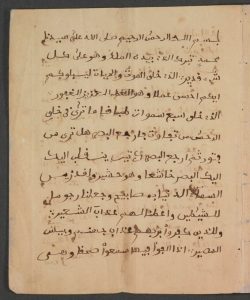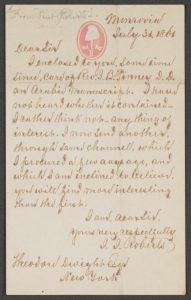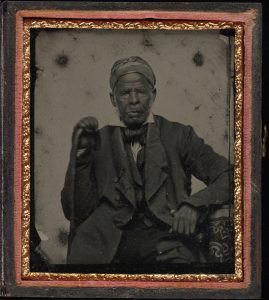This is a guest post by Mary-Jane Deeb, chief of the African and Middle Eastern Division.
Omar Ibn Said. Courtesy of the Beinecke Rare Book and Manuscript Library, Yale University.
In the summer of 2017, the African and Middle Eastern Division of the Library of Congress acquired a collection of unique documents, some dating back to the 1830s. Although the documents are not very old by Library standards — the division and the Library hold manuscripts that are more than 1,000 years old — nonetheless this collection is special. The reason is that at the heart of the 42 documents purchased by the Library is the autobiography of Omar Ibn Said, a native of West Africa captured in 1807 and brought to North Carolina as a slave. He wrote his 1831 autobiography in Arabic while still in captivity. It remains to date the only known one of its kind still in existence.
Now, for the first time, the Omar Ibn Said Collection is available online at the Library of Congress.
The autobiography is short, no more than 15 handwritten pages, in addition to which are blank pages. In it, Ibn Said relates how he was captured and brought on a ship from his homeland to foreign shores in Charleston, South Carolina. He describes how his first owner was a small and evil man who did not fear God and who treated him so badly that after a month, he ran away, moving north until he reached Fayetteville, North Carolina. There he was captured and jailed for 16 days, eventually ending up in the home of General John Owen, the brother of the governor of North Carolina, where he spent the rest of his days until his death in 1863.

The first page of Ibn Said’s autobiography.
But who was Ibn Said before his enslavement? He gives a brief sketch of his life in Africa but enough to create a portrait of a highly educated and well-to-do individual. He says that before he came to this Christian country, meaning the United States, he was a follower of Muhammad the Prophet of God, meaning he was a Muslim. He writes that he went on pilgrimage to Mecca, prayed five times a day, went to the mosque, fought the jihad (holy war) against nonbelievers and gave alms to the poor.
It is from his charitable donations that we can deduce how wealthy he was: “I used to give alms … every year in gold, silver, harvest, cattle, sheep, goats, rice, wheat and barley — all I used to give in alms,” he is quoted as saying in the book “A Muslim American Slave: The Life of Omar Ibn Said.”
Ibn Said also names the place where he was born: Fut Tur, or Futa Toro, located between the two rivers of Senegal and the Gambia. He recounts how he studied and names his teachers, stating, “I continued seeking knowledge for 25 years.” He also describes his family in West Africa, saying that his father had six sons and five daughters, while his mother had three sons and one daughter, implying that his father had had more than one wife. He himself never got married in the United States, and he makes no reference to a wife or children in West Africa.
Ibn Said wrote his autobiography in response to a request by someone he referred to as “Sheikh Hunter” and apparently also at the request of Theodore Dwight (1796–1866), a founder of the American Ethnological Society and a member of the New York Colonization Society, either directly or through the slave owner.

A July 1831 letter from Joseph Jenkins Roberts to Theodore Dwight.
It is thanks to Dwight that much of this collection of documents still exists. It includes his own correspondence with a number of notable individuals who translated, referred to or discussed the autobiography of Ibn Said. For example, the first two presidents of Liberia, Joseph Jenkins Roberts (1809–76) and Stephen Allen Benson (1816–65), responded to Dwight’s enquiries. Their handwritten responses are part of the documents the Library acquired, as are those of Daniel Bliss (1823–1916), one of the founders of what became the American University of Beirut, and those of the Reverend Isaac Bird (1793–1835), a Protestant missionary in Syria who translated some of Ibn Said’s writings.
Dwight, as well as other prominent colonizationists, wanted Ibn Said to write his autobiography, and wanted it to be translated, to undermine claims justifying slavery in the United States. The autobiography was meant to bolster an argument linking literacy and monotheism to manumission, or the freeing of slaves. Dwight was also interested in Islam and in educating Americans about Africa and the people they were capturing and enslaving.
So, what was it that roused the interest of Dwight and others in Ibn Said? There is no doubt that from the start of his captivity Ibn Said stood out because of his erudition and his demeanor. For example, as documented in a 1925 issue of the American Historical Review, a pastor who met him in North Carolina noted, “His whole person and gait bear marks of considerable refinement.” Articles also appeared in journals at the time describing him and discussing his literacy in Arabic and his conversion to Christianity.
The Ibn Said collection also includes a few items written in Arabic by other West Africans. For example, there are three short texts in Arabic by a man called Sheikh Sana See, which were collected by Frederick Hicks, a Sunday school teacher in Panama. See may have been working on the Panama Canal Railway, which was built between 1849 and 1855. In any case, his texts reveal him to have been educated in the Sufi tradition of Islam. Another important Arabic text in this collection, “On the Origin of Man,” was written in a beautiful calligraphy by Mohammed Dekr. This text appears to have been sent to Dwight by Liberian president Benson or former president Roberts. It combines elements of Genesis in the Bible, as well as Islamic thought and African concepts regarding the origin of the world and of man.















